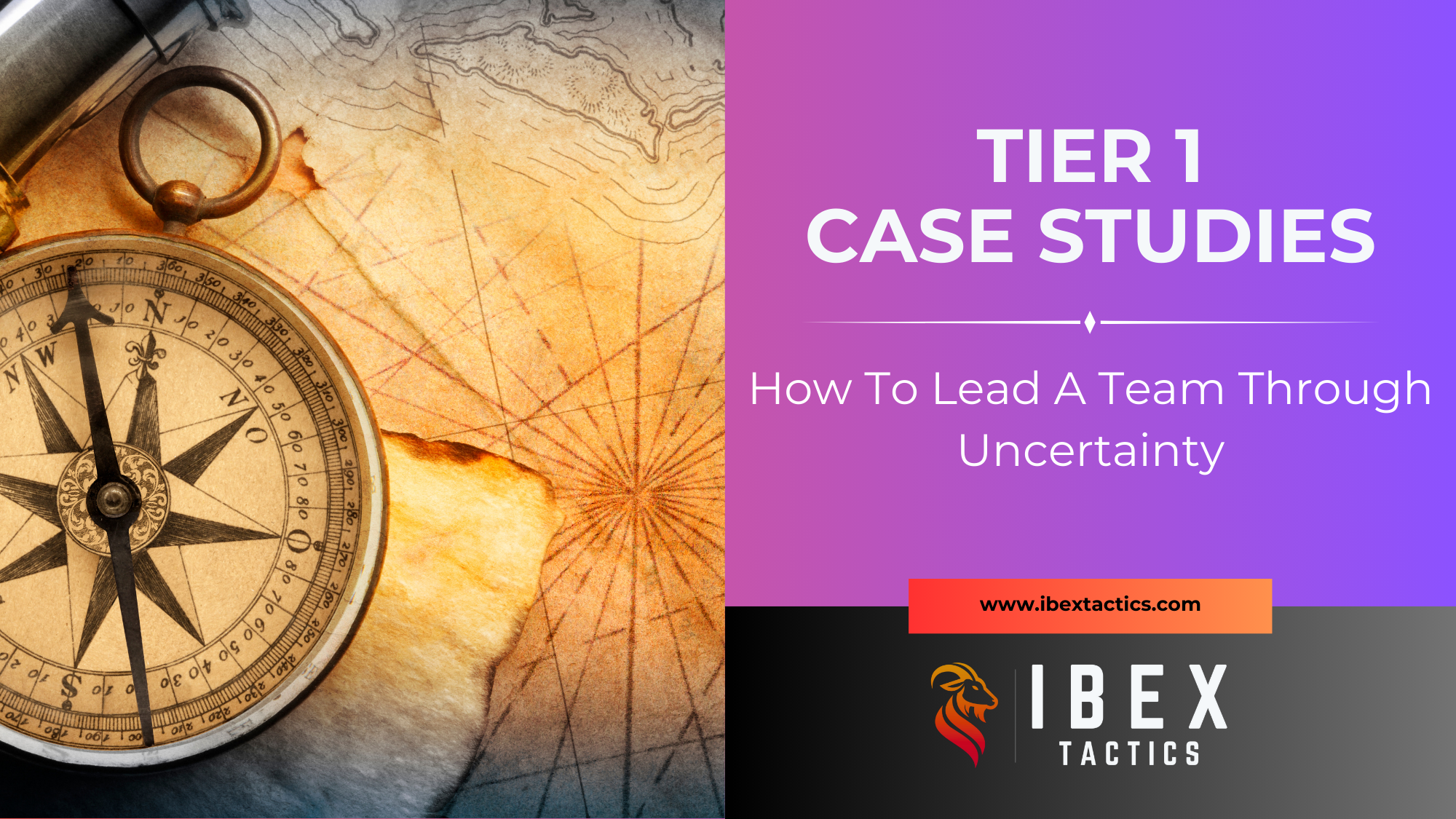How To Lead A Team Through Uncertainty: A Guide for Corporate and Athletic Teams
About Case Study Authors
Ibex Tactics LLC, was founded by Alex Bolowich & Ben Foodman. Before starting the company, Alex and Ben were working with athletes on an individual basis, helping them improve their mental performance using sport psychology-based interventions. While both professionals had incredible success working with some of the world’s most elite athletes, a significant portion of the time they were unable to help some of their clients due to the poor cultures these athletes were immersed in. As a result, Alex and Ben created Ibex Tactics LLC, which dedicated towards providing science-driven solutions to helping teams build resilient cultures.
Introduction: The New Normal of Perpetual Change
Uncertainty is the only certainty in today's rapidly evolving landscape. Corporate teams face existential questions about artificial intelligence potentially replacing jobs, transforming workflows, and shifting competitive advantages overnight. Employees at all levels wonder: "Will my role still exist in five years?" Meanwhile, athletic organizations navigate their own uncertainties—new coaching regimes that overhaul established systems, NCAA policy changes like Name, Image, and Likeness (NIL) regulations that fundamentally alter recruitment and retention, or sudden injuries to key players that threaten championship aspirations.
Whether you're leading a corporate division or a sports franchise, your ability to navigate uncertainty determines not just survival but the opportunity to thrive while competitors falter. This blog outlines a practical framework for steering your team through ambiguous waters with confidence, clarity, and cohesion.
Part I. Understanding Your Landscape
The first critical step in managing uncertainty is developing a comprehensive understanding of your landscape and the specific uncertainties threatening stability. For corporate teams, this means closely monitoring technological disruptions like AI implementation in your industry. Rather than dismissing employee concerns about automation as unfounded, effective leaders acknowledge them directly. Begin by gathering intelligence: Which specific functions might AI enhance or replace? What new roles might emerge? What timeline are we looking at for implementation?
Take the case of a mid-sized marketing agency facing AI tools that can generate content and design elements. Instead of allowing anxiety to fester, the leadership team commissioned a thorough analysis of which creative functions still required human judgment and which administrative tasks could be enhanced through automation. This clarity allowed them to communicate a vision where AI handled routine tasks while team members focused on higher-value strategic and creative work.
In the athletic realm, consider a college basketball program confronting NIL changes. Forward-thinking coaches first assess their program's unique strengths in this new environment: Do they have strong alumni networks to facilitate deals? Does their location provide unique commercial opportunities? They then communicate transparently with players about expectations and opportunities before rumors and outside influences shape the narrative.
The key is addressing uncertainty with your leadership team first, developing a cohesive understanding, and then cascading information throughout the organization in a way that maintains psychological safety. When team members know uncertainties are being actively monitored rather than ignored, they can remain focused on immediate priorities, rather than being distracted by worst-case scenarios.
Part II. Structured Monitoring and Decision Points
Uncertainty requires vigilant monitoring without constant reaction. Establish a cadence of dedicated meetings with your leadership team specifically focused on evolving uncertainties. For corporate settings, create a quarterly "horizon scanning" session where leaders evaluate emerging technological, market, and competitive threats. Each session should conclude with a clear decision framework: "Is this worth acting on now? If so, what specific actions will we take? Or do we continue monitoring?"
For example, a healthcare system tracking AI diagnostic tools might determine that while the technology shows promise, accuracy rates remain below their standards. The decision: continue monitoring quarterly rather than investing immediately but assign a small team to develop implementation scenarios for when benchmarks are met. Prepare for common "what if" scenarios. What if a competitor adopts AI tools before you? What if costs drop dramatically? Having prepared responses prevents panic-driven decisions when triggers occur.
Athletic teams can implement similar monitoring systems. A college football program might establish monthly meetings to track NIL developments across their conference. They prepare specific responses to scenarios like: "What if our star quarterback receives a lucrative offer from a rival program?" or "What if new transfer portal rules are implemented mid-season?"
The University of Michigan football team demonstrated this approach when adapting to coaching transitions, creating preparation protocols for various contingencies rather than reacting with shock when leadership changes occurred. This prepared mindset helped maintain program stability, despite significant uncertainty. Structured monitoring creates a balanced approach—neither ignoring potential disruptions nor overreacting to every market rumor or regulatory shift.
Part III. Adaptability and Flow, or Stall and Die
The final component of leading through uncertainty is cultivating organizational adaptability while maintaining core values and identity.
Successful organizations distinguish between principles that remain inflexible and operational elements that can evolve. This clarity allows teams to adapt without losing their essence.
For corporate teams, core values like exceptional customer service or employee development remain constant while delivery methods evolve. Southwest Airlines maintained its commitment to customer-friendly policies during aviation industry disruptions, adapting operational elements while core brand promises remained sacrosanct.
In changing circumstances, these values actually guide decision making more effectively than rigid strategic plans. When Microsoft faced existential threats from cloud computing, their core commitment to developer experiences guided their transition from packaged software to subscription services.
Athletic teams similarly navigate uncertainty by anchoring to foundational principles. The San Antonio Spurs basketball organization maintained a consistent culture through roster changes and league evolutions by emphasizing fundamental team values like selflessness and continuous improvement. When facing uncertain competitive landscapes, these values provided decision-making clarity for coaches and players alike.
Adaptable organizations create feedback mechanisms to rapidly identify when strategies need adjustment. They celebrate flexibility rather than punishing necessary pivots. Companies like Amazon institutionalize this approach through their "Day 1" mentality—maintaining startup-like adaptability, despite massive scale.
The key is distinguishing small areas where your organization can bend (tactics, methods, specific offerings) versus so the large areas don’t break (core values, fundamental identity, key stakeholder promises).
Part IV. Conclusion - Transforming Uncertainty into Advantage
Leading through uncertainty isn't about eliminating ambiguity—it's about developing organizational muscles to navigate it confidently. By understanding your specific landscape, creating structured monitoring systems with clear decision points, and building adaptability while maintaining core values, you transform uncertainty from a threat into a strategic advantage. The most successful organizations—corporate or athletic—don't just survive uncertainty; they leverage it to outpace competitors who remain paralyzed by indecision or denial. In today's environment, the ability to navigate uncertainty has become the defining leadership competency.
As you implement these approaches, remember that team members take cues from leadership behavior. When they see calm, thoughtful responses to uncertainty, rather than reactive panic, they develop confidence in the organization's resilience. This confidence creates the psychological safety necessary for peak performance even amid changing circumstances. The future belongs to teams that neither ignore uncertainty nor become consumed by it; instead, they develop systematic approaches to harness its potential while mitigating its threats.
NOTE TO READER:
Alex and Ben wanted to compile their expertise in the Ibex Tactics Case Studies to help teams in the sports and corporate sector better understand how many of the issues they are dealing with are, more often than not, related to culture. Most teams recognize that culture is an important component of their success but do not always have the resources or expertise to analyze the complexity of culture. If you are interested in learning more about the services that Ibex Tactics offers to help with culture development, use the contact form below and sign up with your email to receive updates on new services and case studies!
Start your application today!
Are you looking for a way to enhance your organization’s performance outcomes? Are you curious to learn more strategies that can enhance your team culture? Use the form below to begin the application process to get on our client list!
ARE YOU A PART OF THE HERD?!
Make sure you stay up to date on new case studies, services and relevant updates about Ibex Tactics! Don’t wait! Sign up below!












